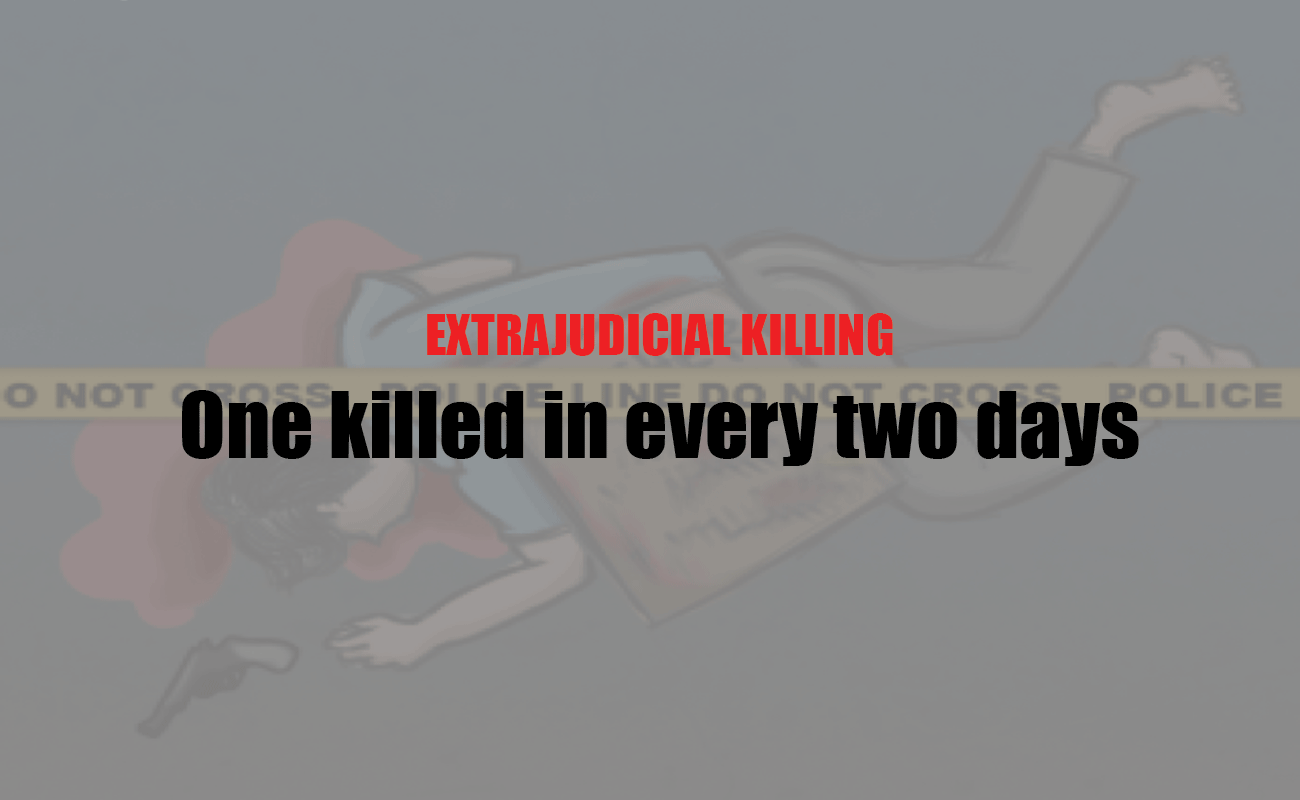
The country has witnessed at least one extrajudicial killing, mostly in alleged incidents of ‘gunfight’ and ‘crossfire’ in every two days in 2018 as such violation of human rights by law enforcement agencies with impunity goes unabated.
Rights activists are worried as allegations have it that in many cases, law enforcers pick up the victims and their families have later come to know that their relatives have been killed in ‘gunfight’ or ‘crossfire’.
They said that extrajudicial killings continued with the government claiming that there was no extrajudicial killing in the country and the National Human Rights Commission failing to play any role in curbing such rights violations.
English daily New Age recently reported killings of 48 people in ‘gunfight’ from January 1 to April 11, including 42 such killings in the first three months.
Rights organisation Odhikar data showed 44 extrajudicial killings from January 1 to March 31. 41 of them were killed in alleged ‘crossfire’ or ‘gunfight’.
Rights organisation Ain o Salish Kendra data showed that 46 people were killed in incidents of gunfights, crossfire, encounter or shooting by law enforcers and 13 of them were killed in custody.
‘There is no crossfire or extrajudicial killing [in the country]. The deaths happened in incidents of gunfights,’ home minister Asaduzzaman Khan told the media on April 7. He claimed that each of the incidents was investigated. ‘A magistrate interrogates the people concerned for a long time after any such an incident,’ the minister said.
National Human Rights Commission chairman Kazi Reazul Hoque said that following newspaper reports, the commission sent letters to the home ministry on several occasions to investigate the alleged extrajudicial killings and the ministry responded that the allegations were not correct.
The commission in its annual report submitted on December 6, 2009 had recommended that the government should carry out independent inquiries into each of such incidents.
‘Each of the incidents should be investigated by an independent inquiry committee of minimum three members comprising a government official not below the rank of deputy secretary, a police officer not below the rank of superintendent of police and a civil society personality of the choice of the family of the victim,’ the then commission chair Justice Amirul Kabir had said after submission of the report.
Three High Court rulings on extrajudicial killings issued between 2006 and 2009 are yet to be disposed of. The High Court first issued a ruling on extrajudicial killing on May 25, 2006. In the ruling, the bench of Justice M Awlad Ali and Justice Zinat Ara asked the government to explain why the killing of Tunda Ismail, arrested in an arms case, remanded in police custody and killed in ‘crossfire’ while in fetters at Lalbagh on May 22, 2006, should not be properly investigated and the offenders should not be brought to justice.
The bench of Justice Syed Muhammad Dastagir Husain and Justice Mamnoon Rahman on August 6, 2006 issued a ruling asking the government and the Rapid Action Battalion to explain why they should not be directed to ensure the security of the people detained in their custody.
The court issued the order after hearing a writ petition filed by rights organisation Human Rights and Peace for Bangladesh, which sought the court’s directive on the government and the battalion in protecting the life of anyone in detention from being killed in ‘crossfire’ or ‘encounter.’
The bench of Justice Syed Mahmud Hossain and Justice Quamrul Islam Siddiqui on June 28, 2009 asked the government to explain why extrajudicial killing by law enforcers in the name of ‘crossfire’ or ‘encounter’ would not be declared illegal.
On November 16, 2009, the bench of Justice AFM Abdur Rahman and Justice
Md Emdadul Haque Azad issued a rule suo moto rule asking the government to explain extrajudicial killings within 48 hours.
Allegations have it that children are also being killed in claimed incidents of ‘gunfight.’ A recent incident of the killing of 15-year-old boy Rakib Hawlader, whom police branded as a ‘snatcher’, in ‘gunfight’ in Dhaka on April 6 drew huge criticism by human rights activists.
Rakib’s mother Rita Hawlader alleged that her son was picked up by Wari police on April 4 and at the police station she saw an officer dragging away her handcuffed son on April 5.
The police, however, denied the allegation.
‘I could hear his screaming shouting “ma” “ma” and was driven out from the police station. On Friday, I came to know that he was killed in “crossfire”. Actually, police killed my son,’ Rita alleged.
Families of many victims alleged that the victims were picked up by law enforcers or remained missing for days and then they had heard that their relatives were killed in ‘gunfight’ or ‘shootout’.
Rights organisation Odhikar secretary Adilur Rahman Khan, expressing concern over extrajudicial killings, termed the incidents as examples of lawlessness and said that such incidents continued ‘in the absence of rule of law, a democratic society and a functional justice delivery system.’
He said, ‘In this situation, even a child can be killed.’
